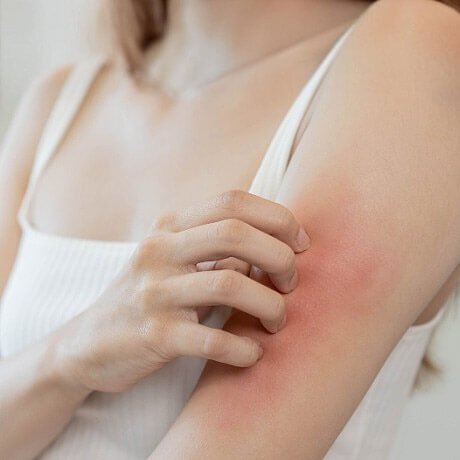Login to your account
- Prescription included
- Genuine medication
- All-inclusive service - No hidden fees
- Free next-day delivery
5 tips for losing menopause weight
Tips for losing weight post-menopause
Menopause is a difficult time for women. Women must contend with a variety of uncomfortable symptoms and emotional struggles during menopause.

On top of all the typical signs, menopausal women also experience weight gain. A lot of factors about menopause cause stubborn weight gain, leaving many women with a lack of confidence.
In this article, we will be talking about menopause weight, why it happens and how to lose it.
Why does menopause cause weight gain?
Menopause is when women’s periods stop due to lowering hormone levels. It happens to most women around 45 - 55 years old, but some women experience it earlier. It’s a natural part of ageing.
Postmenopausal women, on average, gain 1lb each year.
The drop in hormone levels causes many symptoms, including hot flashes, night sweats and vaginal dryness. It also causes weight gain.
On average, women may gain 1lb (0.5kg) each year Trusted source National Center for Biotechnology Information (NCBI) Government Source Biomedical Research and Literature Go to source after their last period. However, it varies. Some women may gain 20% of their original weight.
This occurs due to several factors.
Hormone imbalances
Oestrogen is one of the main hormones to decrease during menopause and is largely responsible for your metabolism. It helps to regulate food intake, body weight, insulin resistance, body fat distribution, energy expenditure and other key processes.

A lack of oestrogen postmenopause causes you to store more calories than you burn due to insulin resistance, meaning it is easier to gain weight than before. The fat distribution is also different so many women will see weight gain around their middle and nowhere else.
Loss of muscle mass
Another significant factor is the loss of muscle mass. Sarcopenia is the term that refers to the gradual loss of muscle mass, strength and function as we age.
Most people are also less active as they get older due to aches and pains, tight joints and fatigue, which attributes to muscle loss.
Muscle burns more calories because it requires more energy, even when you’re just resting. So, less muscle means fewer calories burnt and more fat stored.
Emotional overeating
Menopause is also difficult psychologically. Coping with physical changes, coming to terms with ageing, as well as managing other stresses in their life can cause women to comfort eat or drink.
Can menopause cause weight loss?
Menopause affects everyone differently. While it is more common to gain weight, some women lose weight.
Stress, nausea, dry mouth, indigestion or constipation can all affect your appetite and cause you to lose weight. It may also be due to the decrease in muscle mass.
If there is no clear cause of your weight loss, however, you should contact your GP.
How do I lose menopause weight?
Luckily, weight loss postmenopause is not impossible. Simple lifestyle changes can help you see a difference and feel good about yourself.
Here are 5 things you can do to lose weight during menopause.
1. Change your diet
Because of your metabolism changes, your body will need fewer calories than it used to before menopause. So most women will need to adjust their diet slightly. You don’t need to follow any crazy diet. You just need to make small changes.
| 4 easy ways to improve your diet | |||
|---|---|---|---|
Reduce your portion sizes 
|
Eat less processed foods 
|
Eat a nutritious diet 
|
Drink less alcohol 
|
The key is to reduce your calorie intake. While you don’t need to count calories, you should be mindful of portion sizes.
As well as how much you eat, you should consider what you eat. Processed foods are the main cause of weight gain, especially around your middle, so should be kept to a minimum. Focus on eating more fruit, vegetables and whole grains in your diet.
Although many people don’t realise it, alcohol is also a risk factor for weight gain. It is high in calories and sugar. For example, one glass of red wine has 133kcal! Try to reduce your alcohol intake.
2. Keep active
Exercising is also another way to lose weight. Increasing your muscle mass will help you burn more calories.
The NHS recommends you should do 150 minutes of moderate-intensity exercise per week. That can be 30 minutes a day, 5 days a week.

Try to incorporate some light exercise into your daily routine. Instead of driving to the shops, why not walk if you can? Doing house chores, cycling or going on long walks can also help burn calories.
Exercising will also help with joint pain, improve bone strength and improve your mood overall.
If you’re worried exercise is too intensive, consult your doctor, and they can find a safe and effective solution for you.
3. Reduce stress
Managing your stress and emotions will also help with your weight loss efforts. Cortisol is the primary hormone responsible for stress. Studies Trusted source PubMed Government Source Database of Biomedical Research Go to source show that people with more body fat around their stomach area have high cortisol levels.

In addition, research Trusted source PubMed Government Source Database of Biomedical Research Go to source has also linked overeating to high levels of cortisol. While the link isn’t clear, it is thought that cortisol is related to the hormone leptin - the hormone that makes you feel full.
Exercising will help with stress. Some other ways to reduce stress include:
- connect with others
- dedicate yourself some “me time” to relax
- avoid unhealthy habits like smoking or drinking
- focus on time management
- seek counselling
4. Start HRT
Hormone replacement therapy (HRT) is the first-line treatment for menopause. It works by supplementing oestrogen which reduces symptoms of menopause.
There is some evidence that HRT could help with weight loss for menopausal women. One study Trusted source Oxford Academic Peer-reviewed Journals Multidisciplinary Research Go to source found that HRT significantly reduced insulin sensitivity, a key component of weight gain in women post-menopause.

More research needs to be done on the relationship between HRT and weight loss. However, there’s no doubt that treatment could improve your quality of life overall, which could reduce stress and other risk factors for menopause weight gain.
Re-order your HRT
Start yourconsultation here
HRT is available as patches and tablets on a prescription from your doctor.
5. Consider weight loss treatment
For some people, diet and exercise alone aren’t enough. This is especially true in women with hormone imbalances. If you have a BMI of 30 and above, or 27 and above with a weight-related condition, you may be eligible for weight loss treatment.
Start your weight loss journey
Click here to learn moreThe most effective weight loss treatments are GLP-1 injections like Saxenda and Wegovy. They work by slowing down digestion so that you feel fuller for longer. There are also several tablets available such as Orlistat and Mysimba.
Why should I lose weight?
It may be easy to give up on weight loss, especially after menopause. However, it’s never too late to get healthy.
Losing weight during menopause has many benefits.
- Prevents osteoporosis - strength exercises will increase bone mineral density, which will help strengthen your bones and prevent injury.
- Reduces your risk of diabetes - 1 in 3 postmenopausal women Trusted source National Center for Biotechnology Information (NCBI) Government Source Biomedical Research and Literature Go to source is diagnosed with prediabetes or type 2 diabetes. Losing weight will help reduce the risk.
- Improve your self-confidence - Losing weight will help you feel good as well as look good.
- Reduces your risk of heart disease - Age and weight are both significant risk factors for heart problems such as high blood pressure, high cholesterol, heart disease, heart attacks and strokes.
- Improve your mood - Weight loss will improve your mood in many ways. You have more energy and you feel healthier, which will improve your mental health. Exercise also releases endorphins, which will also make you feel good.
Main takeaways
Gaining weight during menopause is common due to a mixture of hormone changes and ageing. Thankfully, getting treatment and making simple lifestyle changes will help you feel like yourself again.
- Private & confidential serviceDiscreet packaging and encrypted data
- Genuine & branded medicationFrom UK registered pharmacies
- No doctor visit neededOur doctors assess you online
- Free next day deliveryOrder by 4:30 to receive tomorrow
Further reading

Saxenda results: expectations vs. reality
Reviewed by Dr. Caroline Fontana
Understanding Saxenda Side Effects
Reviewed by Dr. Caroline Fontana
Mysimba’s side effects and management
Reviewed by Dr. Caroline Fontana
Wegovy: How well does it work and how quickly?
Reviewed by Dr. Caroline Fontana
Understanding Wegovy side effects
Reviewed by Dr. Caroline Fontana
How does insulin affect your weight?
Reviewed by Dr. Caroline Fontana


How many calories & what should I eat to lose weight?
Reviewed by Dr. Caroline FontanaSelect
medicationFill out a short
medical formDoctor issues
prescriptionMedication sent
from pharmacy




